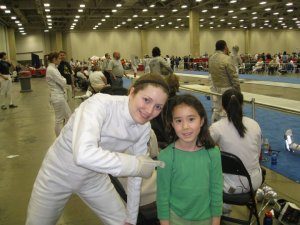Why I coach

When my cousin came to see me fence at a NAC (North American Cup), I took the time to show her a few of the basics.
In my experience, few coaches make a conscious decision to start coaching. It starts small – you’re either the most experienced or the most gregarious of a group of fencers and the newbies need guidance. You start by copying the lessons you remember your own coaches teaching, and eventually start crafting your own style. I’ve been coaching officially for almost ten years, but it started a few years before that when I was a fencer in the Texas A&M Fencing Club. Our real coach, Houston Sword Sports co-owner Dan Gorman, was deployed to Iraq for a year and the other officers and I took over coaching duties to make sure the club didn’t fall too far behind while he was gone. Still, I didn’t start coaching formally until I moved to Houston and found that I could trade my services as a supervisor of kids for free membership in the club. I found that I really enjoyed coaching, and all these years later it is still a source of joy and pride. Here, in no particular order, are some of my favorite things about coaching:
- Sometimes, you get a student who you can tell has never excelled in a sport before, but fencing just clicks for them. I love seeing the excitement on that face as they learn to control the weapon and their body. Over the course of a few months, I’ve seen young fencers transform from the one picked last for team sports to the one winning bouts and medals in class tournaments.
- Other fencers might be even more challenging to coach, where they don’t naturally grasp the mechanics of fencing, or even if they do they lack the coordination or speed to win against others in their class. With these, the challenge is to find the right combination of drills and tactics to keep their motivation up while helping them find their own perfect strategy. This is a kind of problem solving skill that I didn’t possess when I started coaching, but has become easier with experience.
- A lot of fencing, and by extension a lot of coaching, is mental. Sometimes in the heat of competition, a fencer becomes so stressed that they forget fundamentals or neglect effective tactics. Knowing when to push a fencer, when to back off, when to give specific advice (“when he gets close, use a beat attack”) and when to give general advice (“take your time”) – getting that mix right is rewarding for both coach and student.
This doesn’t make it into the list because it is simultaneously one of my favorite and my most frustrating aspects of coaching: when a student beats you on strip. Maybe someday I’ll be able to put enough of my ego aside to just be proud of how well they’re fencing, but for now I’m going to make sure I get my own practice time in, too!
